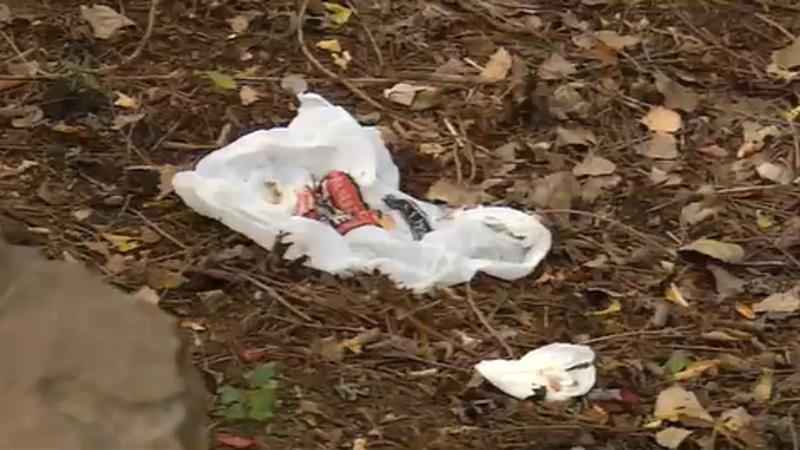Looking at the environmental impact as bag fees return in Minneapolis
[anvplayer video=”5060743″ station=”998122″]
Trevor Russell hunts on the Mississippi River.
"Here’s an example of a single-use plastic bag, and you can see how it’s broken down over time," he says, pointing. "Hate to see this. A single-use plastic Solo cup."
Wandering along a backchannel of the river, Russell showed us his chief quarry: thrown-away plastic.
"About 75% of the trash that we find in and along the Mississippi River is plastic," Russell said. "And of the types of plastic, we found plastic bags were the fifth most common type of trash in the water."
Russell is the water program director for Friends of the Mississippi River.

[KSTP]
The nonprofit is a steward of the river, organizing cleanups and education programs.
Russell has no trouble finding trash, plastic and otherwise, by the channel’s edge.
"Wrapper and then a full bottle, that looks like a pop bottle of some kind," he said, putting the items into a garbage bag.
The job includes following two different trash trails.
"The first would be people just sort of carelessly throwing trash in and along the river, and it makes its way into the water," Russell said. "The second pathway is that any garbage or trash thrown in the streets will eventually be washed by rains into storm drains — and that water flows untreated into the river and will carry any garbage or debris with it. That’s how some of this trash ends up in the river."
All this trash talk comes as the Minneapolis five-cent carryout bag fee goes into effect again, after a pandemic pause.
A city ordinance, taking effect Friday, requires grocery customers to bring their own bags or face paying five cents for each one they get from a retailer.
We asked Enrique Velazquez, the city’s manager of licenses and consumer services, if the new rules will reduce plastic in area waterways.
"Absolutely, we believe it will," he said. "We’ll be able to curb quite a bit of the number of plastic bags that end up in landfills, or end up rolling around our waterways, public lands or end up in trees, or someone else’s yard."
Velazquez says Minnesotans throw away 87,000 tons of plastic bags every year and recycle less than 5% of them.
He adds he hopes the surcharge might encourage people to use their own reusable bags since money from the surcharge pays for the cost to buy additional plastic bags.
"The retailers get to use that money to replenish those plastic bags," Velazquez explained. "The cost isn’t borne by all shoppers at that store, it’s just those who are using the plastic bags. They’re the ones who are going to bear the brunt of that."
But it’s not just plastic bags.
The surcharge applies to paper, compostable and some reusable bags provided by stores.
"It’s a great idea, but until you change people’s attitudes, you aren’t going to be successful," said Tom Moore, from New Hope.
Moore grew up in Minneapolis and used to play with childhood friends along the same Mississippi backchannel that Russell was inspecting.
"You couldn’t even walk in the water when I was a kid, it was too dirty," he said. "But it’s so much better than it used to be."
And what about that bag fee?
"You know, I’ve got reusable bags, they’re much easier to use," he said. "I hope they will, but I’m not going to hold my breath."
Just finished with her shopping at a north Minneapolis grocery store, Michelle Cooper says she’s not a fan of the five-cent surcharge.
"The charge with the bag is kind of getting to me, you know, because I double them, so I’m paying a pretty penny," she said. "I don’t agree with it. But if it’s to conserve, you know, plastic floating around, it’s OK I guess."
City officials say cutting down on the use of plastic bags will reduce clogs in recycling machinery.
They say the plastic can take four to six hours to remove. Using paper bags, the city says, will mean harvesting fewer trees.
Still, there are exemptions:
- bags for produce or bulk foods,
- vendors at farmers markets and other temporary events,
- restaurants or other businesses like salons or dry cleaners where sales are a secondary activity,
- produce bags for meats, baked goods, flowers, prescriptions, or liquor sleeves,
- secondhand bags,
- customers participating in a federal or state food assistance program.
Back on the river, Russell says he, too, believes the surcharge will reduce pollution.
Right now though, he says he’s mostly concerned about the impact of plastic bags.
"They break down and eventually start to work their way up the food chain. They can carry chemicals from their environment into wildlife," he noted. "They can also clog the digestive tracks and respiratory systems of aquatic life. Plastic, as it breaks down in our environment, only becomes more toxic to aquatic life and wildlife that rely on the river for their home."